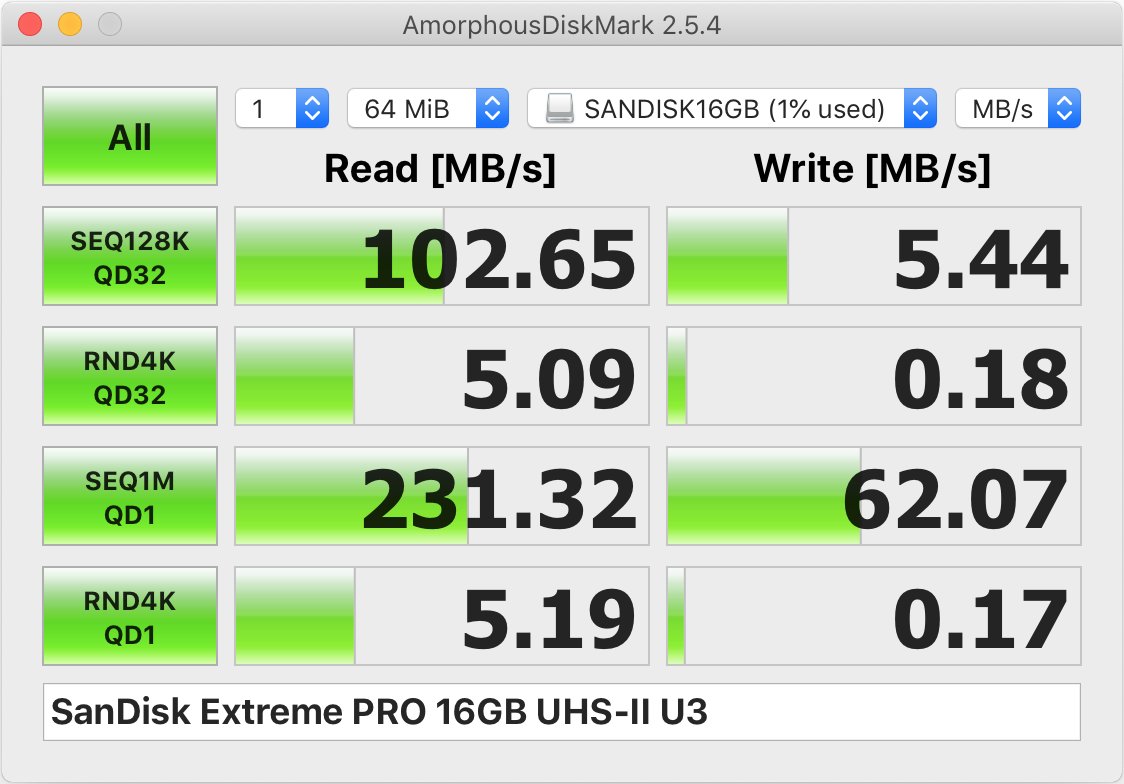| Developer(s) | Noriyuki Miyazaki |
|---|---|
| Initial release | January 31, 2007; 14 years ago (BSD 3-Clause) |
| Stable release | 8.0.1[1] / January 12, 2021; 3 months ago |
| Written in | C++ |
| Operating system | Microsoft Windows |
| Size | 4.0 MiB (zip) |
| Available in | 44 languages |
English, Japanese, Russian, Chinese, etc. | |
| License | MIT license |
| Website | crystalmark.info/en/ |
CrystalDiskMark is an open source disk drive benchmark tool for Microsoft Windows. Based on Microsoft's MIT-licensed Diskspd tool,[2] this graphical benchmark is commonly used for testing the performance of solid-state storage.[3][4] It works by reading and writing through the filesystem in a volume-dependent way. It generates read/write speeds in sequential and random positions with varying numbers of queues and threads.[5] Solid-state drives tend to excel at random IO, as unlike hard drives it does not need to seek for the specific position to read from or write to.[6]

Performance measurements were done with AmorphousDiskMark on macOS 10.15.1. Average of SD UHS from four different vendors. Developing for reliability and quality There are many reasons why users should take full advantage of using the SD Memory Card Formatter instead of their operating system’s built-in formatting tool. However, I'm getting mixed results with BlackMagic and AmorphousDiskMark (CrystalDisk clone for Mac) File copying does reach to advertised speed (almost 1000MBs) Drive is pre-formatted to ExFat. On Mac, need to use Terminal, DiskUtils, and dd to re-format it into APFS to. CrystalDiskMark is an open source disk drive benchmark tool for Microsoft Windows. Based on Microsoft's MIT-licensed Diskspd tool, this graphical benchmark is commonly used for testing the performance of solid-state storage. I tested this drive by transferring large individual files as well as large folders with multiple files and the results visually were pretty good. Here are the results of the sequential transfer speeds when tested using the AmorphousDiskMark software for the Mac: Sequential Read speeds: 144.6 MB/s Sequential Write speeds: 20.43 MB/s. Paragon NTFS 15.8.199 - Provides full read and write access to Windows NTFS drives in macOS. Download the latest versions of the best Mac apps at safe and trusted MacUpdate.
There is a macOS clone version of it called AmorphousDiskMark developed by Katsura Shareware, named after the non-crystalline amorphous state of solids.[7]
CrystalDiskInfo[edit]
| Developer(s) | Noriyuki Miyazaki |
|---|---|
| Initial release | May 22, 2008; 12 years ago (BSD 3-Clause) |
| Stable release | |
| Written in | C++ |
| Operating system | Microsoft Windows |
| Size | 6.4 MiB (zip) |
| Available in | 44 languages |
English, Japanese, Russian, Chinese, etc. | |
| License | MIT license |
| Website | crystalmark.info/en/ |
CrystalDiskInfo is an MIT-licensed S.M.A.R.T. utility for reading and monitoring disk drive status. Like CrystalDiskMark, this tool is designed with an emphasis around solid state devices, supporting NVMe connections in addition to the usual PATA and SATA. Other feature include Intel RAID support, e-mail and sound warnings, and AAM/APM adjustment.[9]
Mascot[edit]
The developer website for CrystalDiskMark, Crystal Dew World, features prominently an anime mascot called Suisho Shizuku (Japanese: 水晶雫). She was introduced in the March 2012 update through a special skin for CrystalDiskMark 3.0.2.[10] As of CrystalDiskInfo 7, she is voiced in Japanese in the special version.[11]
See also[edit]

References[edit]
- ^'History'. Crystal Dew World [en]. Retrieved 2021-01-12.
- ^'CrystalDiskMark'. Crystal Dew World [en]. Retrieved 6 April 2019.
CrystalDiskMark 4-6 uses Microsoft DiskSpd (The MIT License).
CS1 maint: discouraged parameter (link) - ^'Adata XPG SX8200 Pro NVMe SSD review: Top-tier performance for a song'. PCWorld. 14 December 2018. Retrieved 6 April 2019.CS1 maint: discouraged parameter (link)
- ^'Microsoft Surface Go with 64GB eMMC storage – How much slower is the $399 model?'. Windows Central. 2 August 2018. Retrieved 6 April 2019.CS1 maint: discouraged parameter (link)
- ^'Main Window'. Crystal Dew World [en]. Retrieved 6 April 2019.CS1 maint: discouraged parameter (link)
- ^'Understanding Solid State Drives (part two – performance)'(PDF). HP. 2008-10-27. Retrieved 2011-07-06.CS1 maint: discouraged parameter (link)
- ^'AmorphousDiskMark for macOS - measures storage read/write performance'. katsurashareware. Retrieved 6 April 2019.CS1 maint: discouraged parameter (link)
- ^'History'. Crystal Dew World [en]. Retrieved 2021-03-21.
- ^'CrystalDiskInfo'. Crystal Dew World. Retrieved 6 April 2019.CS1 maint: discouraged parameter (link)
- ^CrystalDiskMark 3.0.2 Shizuku Edition Crystal Dew Blog
- ^'CrystalDiskInfo 7 Shizuku Edition'. suishoshizuku. Retrieved 6 April 2019.
She can speak Japanese only.
CS1 maint: discouraged parameter (link)
Benchmarking a MacBook Air M1's SSD.
Awhile back, I made a video about USBc and the classic Mac Pro but lamented yet ago the terrible benchmarking on macOS. The first commenter on FaceBook pointed out that we finally have a good disk benchmark utility AmorphousDiskMark. While it isn't a direct port, it's heavily inspired by the famed and loved Windows utility, CrystalDiskMark.
So why am I always complaining about BlackMagic Disk Speed Test
BlackMagic's Disk Speed Test only tests one thing, continuous throughput. This is useful but only measures one aspect of an SSD, and doesn't necessarily mimic accurately how most disk interactions occur. Random Read and Write tests are as important, if not more so, as many SSDs can deliver fast maximum continuous read and writes but much less so for random small data blocks. CrystalDiskMark tests random reads and writes both as queued requests and single requests. The default depth is pretty high for the test. Usually, an OS wouldn't have that deep of a queue, but the Q1T1 does mimic a singular request. Also, CrystalDiskMark measures IOPS (Input/Output Operations-per-second), which is similar but also a different measure of disk speed.
Better but not perfect
Crystal Disk Mark Free
There's plenty of aspects that aren't covered, such as latency, burst performance, power consumed, and mixed random read/writes, but this is a massive step in the right direction for gauging SSD performance on macOS. Oh yeah, and it's free.
Amorphous Diskmark
Let's retire BlackMagic's Disk Mark and embrance Amorphous Disk.
